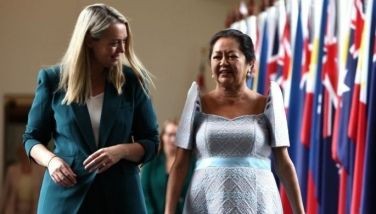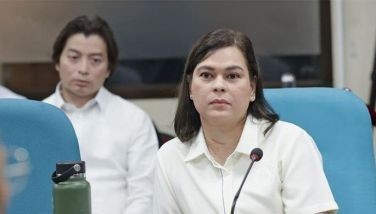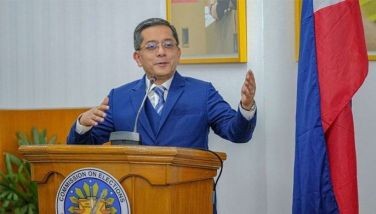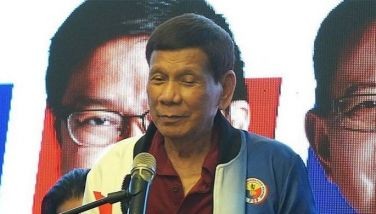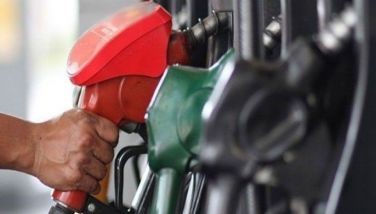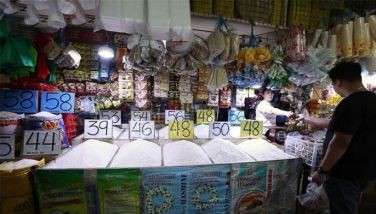Duterte meeting with Obama, Putin
Aussie, India, Japan talks also set
MANILA, Philippines – If everything goes as planned, President Duterte will be meeting with at least five heads of state, including US President Barack Obama and Russian President Vladimir Putin, on the sidelines of the Association of Southeast Asian Nations (ASEAN) summit in Laos next week.
Duterte is also expected to meet with Australian Prime Minister Malcolm Turnbull and his counterparts Narendra Modi of India and Shinzo Abe of Japan, Foreign Affairs Secretary Perfecto Yasay Jr. told The STAR during the Japan-ASEAN Media Forum in Mandaluyong last Monday.
Reports yesterday quoted White House Deputy National Security Adviser Ben Rhodes as saying that the meeting between Duterte and Obama would be held on Sept. 6.
Rhodes said Obama is expected to raise human rights and security issues, including the South China Sea dispute, during the meeting.
Putin had skipped last year’s Asia-Pacific Economic Cooperation summit in Manila.
Duterte had earlier told the ambassadors of Australia and the United States to shut up after they criticized his remarks on the rape of an Australian women held hostage and then killed in a Davao prison riot when he was the city mayor.
Recently, Duterte, his speech laced with expletives, also called US Ambassador Philip Goldberg a “gay” whom he disliked. The remarks prompted the US State Department to summon the Philippines’ chargé d’affaires in Washington.
Duterte has not apologized to either Goldberg, who is ending his tour of duty in Manila, or to Australian Ambassador Amanda Gorely.
The US State Department has expressed “deep concern” over the spate of killings of suspected drug offenders in the Philippines, as it cited the need for the Duterte administration to uphold the rule of law.
The comment, however, did not sit well with Duterte, who reacted by reminding the US of the killing of African Americans by US law enforcers.
The Philippine leader has also accused the US of “importing terrorism” to the Middle East and even called US Ambassador Philip Goldberg “gay” and a “pest.”
The leaders of Australia, Japan, and India – all dialogue partners of ASEAN – have also expressed interest in holding bilateral meetings with Duterte, the foreign affairs chief added.
Asked if Duterte would also meet with Chinese leaders, Yasay said: “There is no request from the Philippine side and none also from China for bilateral meetings.”
“Perhaps the Chinese premier may see and shake hands with President Durterte in a photo opportunity,” he added.
Yasay said the President has no definite plans yet to visit China, which is hurting from an international arbitral court ruling invalidating Beijing’s massive territorial claim in the West Philippine Sea and South China Sea.
“We must first create an environment conducive to trips,” Yasay said.
“There are no firm plans yet but we would like to see these trips happen. We’re working hard to make it happen,” the country’s top diplomat added.
China, Indonesia visits
But at the House appropriations committee hearing yesterday, Yasay said China and Indonesia are the first countries that Duterte intends to visit as head of state.
He told the committee chaired by Davao City Rep. Karlo Alexei Nograles that the Jakarta trip would take place after the ASEAN summit in Laos next month.
He said there is no date yet for the Beijing visit but it would signal the start of formal bilateral talks on rekindling ties affected by the arbitral ruling.
However, before the start of formal talks, the Philippines would want Beijing to allow Filipinos to fish in Panatag (Scarborough) Shoal, also called Bajo de Masinloc.
“Under the arbitral court ruling, Scarborough Shoal is the traditional fishing ground of Filipinos as well as the Chinese and Vietnamese. Before the bilateral talks, we want to have a provisional agreement that would allow our citizens to fish in this area,” he said.
Zambales and Pangasinan fishermen tried to return to Panatag after the court handed down its decision last July but they were driven away by huge Chinese coast guard patrol vessels.
Over the weekend, Duterte appealed to China through its ambassador in Manila to treat Filipinos “as friends, not enemies.”
The President said any talks or arrangements with China would be in accordance with the arbitral court ruling.
Yasay said Philippine Coast Guard ships would escort Filipino fishermen who want to reclaim their fishing ground in Panatag Shoal “so they would be protected.”
“But we do not want a shooting war. We will exercise maximum restraint. We will pursue the diplomatic processes that we have been using. Any adverse action on the part of China will be strongly protested. That is all that we can do for now,” he said.
Duterte has appointed former president Fidel Ramos as his special envoy to Beijing.
Ramos recently met in Hong Kong with two Chinese officials. They discussed allowing Filipino fishermen in Panatag Shoal.
China has welcomed the possibility of formal talks with the Philippines but insisted it doesn’t recognize the arbitral court ruling.
The Philippines controlled Panatag Shoal until 2012 when the Chinese seized it after a standoff with the Philippine Navy.
Before he stepped down last June 30, former president Benigno Aquino III revealed that China did not honor a US-brokered face-saving deal that called for Philippine and Chinese Coast Guard vessels to leave the contested area.
The shoal is about 120 nautical miles from Zambales and three times that distance from China.
In its ruling, the arbitral court said three disputed areas, including Panganiban (Mischief) Reef and Recto (Reed) Bank, are within the Philippines’ exclusive economic zone.
The Chinese have built military fortifications in Panganiban Reef, while it has resisted Philippine efforts to explore for oil and natural gas in Recto Bank.
The Department of Energy has suspended an oil and gas exploration contract with a private company in the area.
Recto Bank in Palawan is farther away from China than Panatag. It is believed to have more natural gas and oil deposits than Malampaya, which is supplying a large part of the fuel requirements of power plants in Luzon. Malampaya will dry up in a few years. – With Jess Diaz
- Latest
- Trending



















